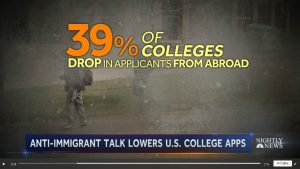A new survey reveals that nearly 40% of universities in the US experienced a decline in international applications from countries, China, India, and especially the Middle East. http://www.nbcnews.com/nightly-news/survey-finds-foreign-students-aren-t-applying-american-colleges-n738411
According to the survey, the most frequently noted concerns of international students and their families include:
– Perception of a rise in student visa denials at U.S. embassies and consulates in China, India, and Nepal.
– Perception that the climate in the U.S. is now less welcoming to individuals from other countries.
– Concerns that benefits and restrictions around visas could change, especially around the ability to travel, re-entry after travel, and employment opportunities.
– Concerns that the Executive Order travel ban might expand to include additional countries.
A decrease in international enrollment at some schools could have a great economic impact, given that international students brought more than $32 billion in 2016 into the U.S. economy.
<Discussion questions>
What is the impact of the US international students decline on the US other than economic impact mentioned above? What is the effect on higher education institutes in the world?
<Reference>
http://college.usatoday.com/2017/04/12/college-applications-from-international-students-are-taking-a-hit/
https://www.masterstudies.com/news/New-Trends-in-US-International-Student-Enrollment-1535/

Thanks for sharing, Sho!
From my observation, maybe it is because of the uncertainty over U.S. immigration policy, while other areas such as Australia and Canada, give a much looser visa and immigration policy towards international students.
In one class, I remembered that Prof. Lefebure asked a question that did the U.S. worry about the brain dry? Although the results will not be so obvious in the near future, it does affect the U.S. higher education, especially those subjects are reliant on international students such as natural sciences and engineering. I would guess that such declines might also have a major impact on a university’s financial bottom line because international students at public universities pay tuition rates that are much higher than for in-state students. I would say that top international students are still eager to reap the benefits of an American top education. But the U.S. might lose international students in the middle to Britain, Canada, and Australia.
Thanks, Sho! So in this case U.S. apparently looks like a loser in terms of economic loss, but I’m wondering which countries could be winners and what kind of policy can drive that.
Considering that a great portion of international students are Asians (especially from China and India), other alternatives could simply be U.K. But if Asian countries such as Australia, Singapore and Malaysia can attract more student who otherwise go to the U.S., coupled with distinguished faculty and also removal of barriers (e.g. VISA requirement), then these countries could also be winners. Japan? Probably not, just because Japanese universities cannot be alternative to U.S. universities…
Thanks for sharing Sho! In class, we have discussed how this could lead to less “internationalization” which can have a number of consequences including perhaps a decline in the US’s leadership status in innovation in various industries. For other institutes in the world, this is a lucrative opportunity – not only financially but also in terms of rising as a higher education leader. I think international students will turn more towards developed English speaking countries with the promise of employment/ immigration such as Canada and Australia.There is also an opportunity here for Asian higher educational institutes in China and perhaps Singapore to gain prominence and more international students if they meet this demand swiftly (i.e. through increased scholarships, or promise of employment/immigration following graduation).
Thanks for the articles Sho! I think for the so-called “best and the brightest”, most would still apply as whether true or not, they are likely to perceive themselves as being able to find jobs or switch to a high-skilled worker visa after graduation. Even that the UK is also tightening its student visa rules and has prevented students from switching to a work visa easily, perhaps some may choose to study in other rapidly rising universities in Asia especially if they are English-based e.g. Singapore, but from other recent readings and my own discussions with other international students, the US, despite the recent events, still seems to exert a great pull on many international students. I guess it’s still a little too early to conclude anything concrete and it remains to be seen whether such fears will remain or dissipate over time.
Alicia, I agree with you. I think it is too early to tell the long term effects, and I also agree that “best and brightest,” at least in general, will not be effected. Due to Trump’s apparent unpredictability, there could be some problems, of course. Like how haphazard implementation of the first version of travel ban. Over time, I think the “best and brightest” will get an exception. I found this article discussing how the travel ban could effect doctors in the rust belt: https://fivethirtyeight.com/features/trumps-new-travel-ban-could-affect-doctors-especially-in-the-rust-belt-and-appalachia/
Essentially, since there are so many doctors and doctors-in-training that are from the consistently banned-labeled countries, and since they are congregated in the rust belt, if they were kicked out of the US there could be a debilitating decrease in doctors in the region. Trump and his administration may overlook these types of situations initially, but once he realizes the backlash, I’m sure (I’d hope, haha) he’d make exceptions along the way to ensure it doesn’t happen.